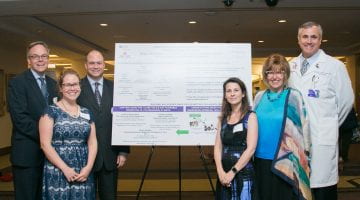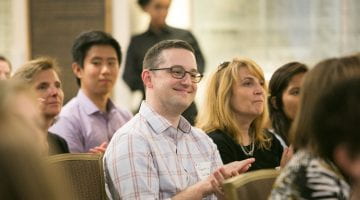NIMH Funded NU-MHE T32 Post-Doctoral Fellowship
The Institute for Innovations in Developmental Science (DevSci) is a University-wide network of transdisciplinary researchers from Northwestern’s Feinberg School of Medicine, School of Communication, School of Education and Social Policy, Weinberg College of Arts & Sciences, Ann & Robert H. Lurie Children’s Hospital, and our other partners. As reflected in the DevSci’s “Healther, Earlier” mission, the Institute aims to catalyze research and training that accelerates translation of developmental discovery to real world application. Particular focus is on mutable early life mechanisms and their intersection with ongoing developmental experience –to generate innovative science and its application to improve life outlooks and health outcomes as early as possible in the life cycle for highest reach and impact. DevSci activities are designed to foster the next generation of translational developmental scientists. If you are interested in learning more about the Institute for Innovations in Developmental Science, please see our institute’s home site.
On this site you will find more information on our Northwestern University – Mental Health Earlier T32 (NU-MHE T32) Post-Doctoral Training Program supported by the National Institute of Mental Health (NIMH) Grant.
NIMH T32 Postdoctoral Mental Health, Earlier Fellowship Announcement
We are currently accepting applications for our NIMH-funded T32 Mental Health, Earlier (NU-MHE)::
For Fullest Consideration Please Apply by November 15th
We are currently accepting applications for our NIMH-funded T32 Mental Health, Earlier (NU-MHE): Transdiagnostic, Transdisciplinary, Translational Postdoctoral Training Program in Neurodevelopmental Mechanisms of Psychopathology (PIs Stewart Shankman, PhD & Laurie Wakschlag, PhD). NU-MHE is housed in the Institute for Innovations in Developmental Sciences (DevSci) at Northwestern University, a university-wide institute of over 150 developmentally-oriented scholars with innovative collaborative and training platforms focused on neurodevelopmental mechanisms of health.
We will have two available slots for 2025-2026 and can guarantee funding for the first year, with the possibility of a second year upon renewal or with institutional or mentor support. Remote fellowship is an option for exceptional candidates.
The NU-MHE T32 fellowship provides a novel transdisciplinary approach designed to launch the next generation of neurodevelopmentally-oriented mental health researchers poised to accelerate the pace of clinical translation. NU-MHE is specifically designed to bring together personally- and disciplinarily- diverse trainees (including both PhD and MD scholars) and mentors as a paradigm for advancing cutting edge translational mental health research. We have an especially close partnership with Ann & Robert H. Lurie Children’s Hospital. Special consideration will be given to crafting the fellowship to meet the needs of physicians scientists. Although we prefer fellows to be on-site, exceptional applicants who need to be remote may be considered.
The core of NU-MHE’s training is the characterization of neurodevelopmental mechanisms of psychopathology within lifespan and environmental contexts. This neurodevelopmental emphasis will be complemented with training across three intersecting spheres: (1) Applied computational and other advanced data science methods; (2) intervention and prevention/implementation research and strategies; and (3) the intersection of mental and pediatric health. Each fellow will select one of these spheres as an area of concentration for more in-depth training, along with their core training in neurodevelopmental mechanisms of psychopathology. Fellows will develop a mentoring team comprised of (a) a mentor in neurodevelopmental and environmental mechanisms of psychopathology and (b) a mentor in their chosen sphere of concentration.
The successful applicant must have completed the PhD and/or MD plus advanced research training prior to the start of the position and must have US citizenship or permanent resident status. Candidates who have not yet completed their degree but will have done so prior to the start of the fellowship, must provide official written documentation of completion date from their current Department or School. We are committed to creating a diverse group of trainees and welcome applicants from across under- represented racial and ethnic groups and people with disabilities.
Advanced research training in fields such as: developmental psychopathology, child psychiatry, neurology, pediatrics, developmental cognitive neuroscience, social determinants of health, mental health prevention, treatment, and/or implementation, mental health disparities, or related fields.
Application review will begin on November 16th, 2024, and applications will be considered until the positions are filled.
Please visit https://sites.northwestern.edu/devscinorthwesternedut32mentalhealthgrant/ for more information about the NU-MHE training project and to see the faculty mentor profiles. Or, please visit https://devsci.northwestern.edu/ to learn more about the Institute for Innovations in Developmental Sciences. For more information or with questions, please contact Center Associate Director, Jessica Horowitz, PhD. jessica.horowitz@northwestern.edu
To submit your application materials, go to https://competitions.fsm.northwestern.edu/grants/MHET32. For additional information or with questions, please email the program Associate Director.
Required Materials Include:
1.Graduate transcripts
2.A research statement, 1-2 page in length, including:
•Candidates’ scientific background and focus,
•Research project(s) proposed for the duration of the fellowship,
•Candidates should explicitly address how their proposed project(s) align with the NIMH Strategic Objectives and the RDoC Framework.
3.1-2 page training plan, including:
•Proposed Training Plan and training goals.
•List of Mentoring Team.
•A description of long-term career objectives and how experience and training will prepare the candidate for a clinical research career in neurodevelopmental mechanisms of psychopathology, including (as applicable) considerations of collaborative/team science orientation, diversity, and public health implications of their work.
•Any unique circumstances, qualifications or experiences may be described in this section.
4.Current CV with list of publications and any grant support (including in-press or under review)
5.Please have the following sent via email to the Institute’s Associate Director, Jessica Horowitz, PhD
Jessica.horowitz@northwestern.edu:
•A total of three letters of reference with your “FIRST INITIAL LAST NAME MHE LOR” in the subject line. These letters of reference can be emailed directly from the writer to our Associate Director.
•Confirmation from your NU-MHE Primary Mentor. Applicants are expected to reach out to potential mentors before applying. Mentors must submit a brief statement documenting their approval of the proposal. Note that a letter of reference from your primary mentor is not necessary.
Commitment to Diversity, Equity, Inclusion and Belonging: The MHE-T32 is dedicated to training fellows that will enhance diversity and equal opportunity in higher education and mental health research. As our healthcare and academic institutions serve increasingly diverse constituencies, it is vital to understand the ways in which differences in gender, class, race, ethnicity, religious affiliation, and other identities can both divide us and offer us better ways of thinking and working. The DevSci & MHE T32 faculty strive to be an inclusive community that places high value on diversity, equity, and belonging and seek candidates who will broadly increase the department’s diversity, equity, and inclusion through lived experience and/or membership in a historically marginalized group in the developmental sciences and are committed to training fellows to work in an increasingly diverse society by promoting equity and justice for all individuals, actively working to eliminate barriers and obstacles created by institutional discrimination. In particular, we encourage applications from members underrepresented in the biomedical workforce as defined by the NIH (https://diversity.nih.gov/about- us/population- underrepresented To this end, we strongly encourage Black, Indigenous, Hispanic or Latinos and other people of color, transgender and non-binary people and other sexual minorities; people with disabilities; and women to apply.
Engagement in discrimination or harassment against any person because of race, color, sex, religion, national origin, ancestry, age, marital status, military service, disability, sexual orientation, and gender identity or expression will not be tolerated. NU-MHE has a central objective to advance the health and wellbeing of diverse populations. The importance of respecting and valuing this aspect of diversity permeates interactions and activities throughout the program. Northwestern University is an Equal Opportunity, Affirmative Action Employer of all protected classes, including veterans and individuals with disabilities. Hiring is contingent upon eligibility to work in the United States.
Faculty Mentors for the MHE T32 Postdoctoral Training Program
Please Reach out to Mentors prior to submission of application materials
|
Neurodevelopmental Mechanisms & Mental Health Research Faculty Mentors |
Computational Psychiatry and Data Science Faculty Mentors |
|
|
|
|
Prevention/Implementation Science Faculty Mentors |
Intersection of Mental Health and Pediatrics Health Faculty Mentors |
NU-MHE T32 Leadership

Laurie Wakschlag, PhD – Principal Investigator for NU-MHE T32, Director of the Institute for Innovations in Developmental Sciences, Professor & Vice Chair for Scientific & Faculty Development, Department of Medical Social Sciences, Feinberg School of Medicine

Stewart Shankman, PhD – Principal Investigator for NU-MHE T32, Professor & Chief of Psychology, Department of Psychiatry & Behavioral Sciences, Feinberg School of Medicine

Jessica Horowitz, PhD – Associate Director of the MHE-T32 Grant and DevSci, & Research Assistant Professor, Department of Medical Social Sciences, Feinberg School of Medicine
Explore the MHE-T32 website

MHE Fellows Research
Learn more about current Fellows’ Research

About the MHE Postdoctoral Fellowship
Learn more about the fellowship curriculum, offerings & how to apply

MHE Mentors
Learn about the Mentors for the MHE-T32 Training Program, Post-Doc Fellows, DevSci’s Affiliate faculty & resources

New & Announcements
Learn more about current fellow activities and the institute’s research

MHE Seminars & Programs
Find more details about ongoing and upcoming T32 events.

Apply Now
Find application requirements here.
